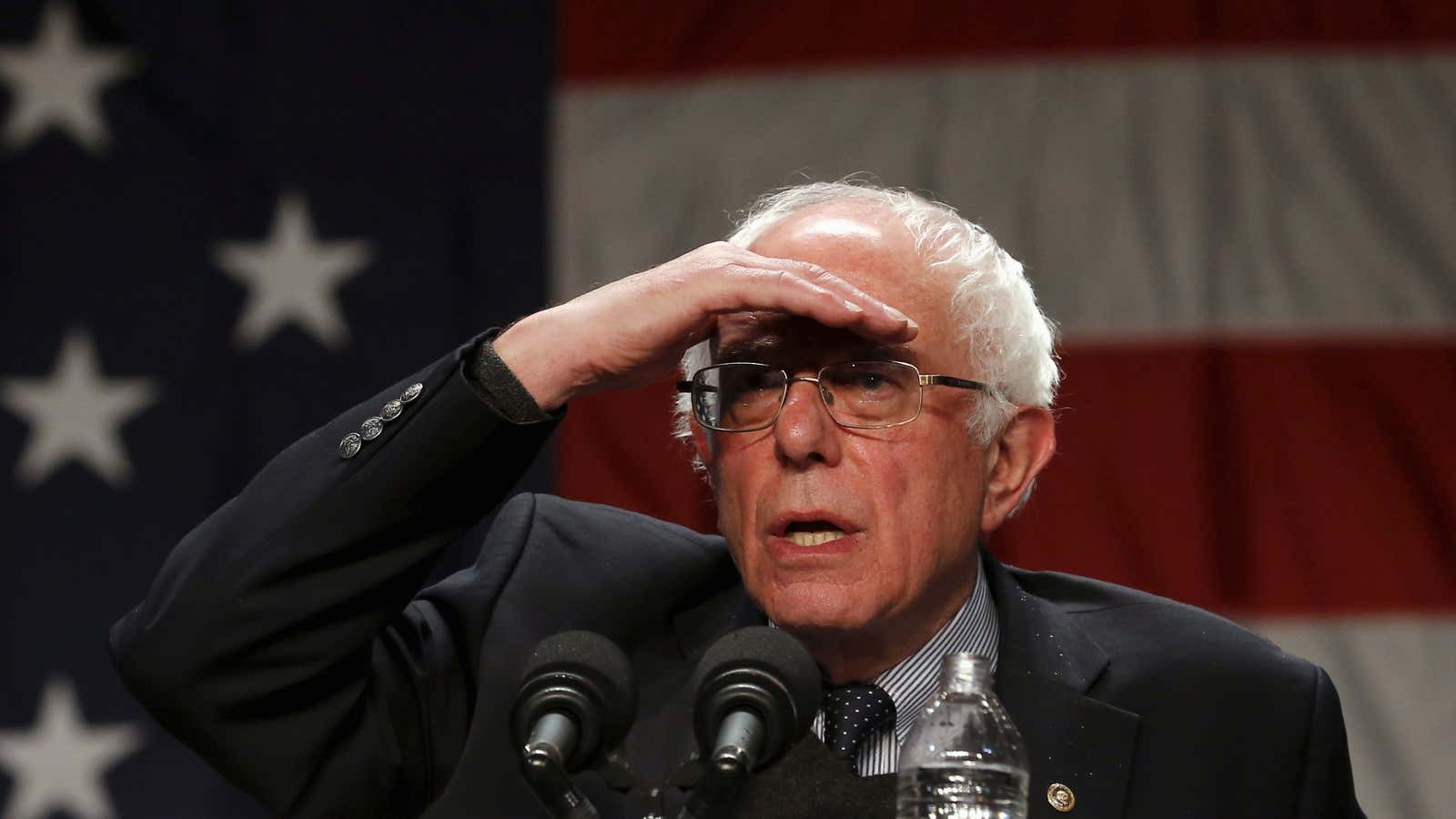And you thought this day would never come: GOP operatives have decided that the smart move is to help out a socialist.
In the past few days, staffers at the Republican National Committee (RNC) have been sending out tweets and emails praising Democratic presidential candidate Bernie Sanders and defending him against the attacks of rival Hillary Clinton. RNC chair Reince Priebus has backed up Sanders’s claim that he is the most electable Democrat by saying that Hillary Clinton would be easier to beat. Meanwhile, America Rising, a GOP opposition research group, has criticized Chelsea Clinton for her “vicious negative attacks and mudslinging” against Sanders.
No, Republicans have not adopted “The Internationale” as their anthem and they do not really want Bernie Sanders to be president. In the peculiar logic of Washington politics, they figure that what’s good for Sanders is good for the GOP.
The theory goes something like this: If Sanders proves strong enough to carry the fight all the way to the California primary in June, Clinton will have to use up a lot of money during the initial stage of her campaign. According to The New York Times, Clinton aides have told supporters that an extended ground game would cost about $50 million. Every dollar that she spends against Sanders in the spring is a dollar that she cannot spend against the GOP challenger in the fall. Republicans are familiar with this phenomenon. In 2012, the Obama campaign carefully planned for the general election campaign while Mitt Romney was burning millions to fend off Newt Gingrich and Rick Santorum.
This year’s GOP nomination contest promises to be a lot like a Quentin Tarantino movie: long, bloody, and weird. Republicans probably figure that they’ll have better odds if the Democrats have to deal with the same thing.
And then there’s the off-chance that Sanders could come out on top. That outcome isn’t likely, but it’s also not impossible, especially if Hillary Clinton runs into more legal problems. Conventional wisdom is that Sanders would be something of a weak standard-bearer. All of his 74 years show in his face and frame. And his avowed socialism, while popular among younger leftists, is less likely to be popular on the national stage. Last year, Gallup surveyed Americans on the acceptability of presidential candidates with various characteristics. By a 50 to 47% margin, respondents said that they would not vote for a socialist—the worst rating of any of the characteristics in the poll.
Some Republicans may see another benefit from a Sanders surge, albeit an indirect one. New Hampshire independents can take part in either party’s primary. Sanders thinks that his economic populism can win over a large number of voters who would otherwise go with Donald Trump. The notion makes sense for voters who care less about ideology than anger. They want to give the finger to the Establishment, and they don’t care whether the finger is on the right or left hand. If Sanders won enough of these voters to make a dent in Trump’s total, the establishment GOP—which has viewed Trump’s rise with concern—would be pleased.
Such gamesmanship is not without precedent. Political parties have played in each other’s primaries before. Indeed, a sideshow of the Watergate scandal was the “Canuck letter,” a fake letter alleging that Democratic US senator Edmund Muskie of Maine had condoned a slur against people of French Canadian descent—a significant voting bloc in New Hampshire. While investigators later disclosed that Nixon aides concocted the letter, its reported existence was one of many problems that doomed Muskie’s once-promising presidential campaign in 1972.
And it’s certainly not simply a Republican strategy. In 2012, Democratic senator Claire McCaskill was facing a difficult reelection campaign in Missouri. Her campaign devised a brilliant trick to secure the GOP nomination of Congressman Todd Akin, who was both ideologically extreme and politically inept. McCaskill recalls: “I told my team we needed to put Akin’s uber-conservative bona fides in an ad—and then, using reverse psychology, tell voters not to vote for him.”The ad said that Akin was “too conservative” for the state. “This presentation made it look as though I was trying to disqualify him, though, as we know, when you call someone `too conservative’ in a Republican primary, that’s giving him or her a badge of honor.” The ploy worked. Akin won the primary, then lost to McCaskill in the general election.
Nevertheless, those who would pick their opponent should be careful what they wish for. In 1966, California’s Democratic governor Pat Brown (father of Jerry) worried about George Christopher, a moderate former mayor of San Francisco, who was running in the Republican gubernatorial primary. Brown supporters leaked damaging accusations against Christopher to the media. Republican voters then chose the candidate that Brown wanted to face, a faded actor and hardline conservative named Ronald Reagan, who would go on to smash Brown by a 15-point margin.
Might the same thing happen with Sanders? It’s too early to tell, and we may never get a chance to learn. But political operatives should remember that clever maneuvers can have unanticipated consequences.
